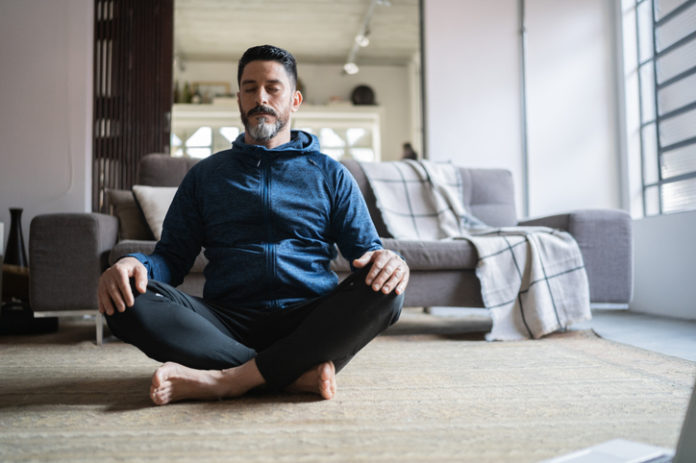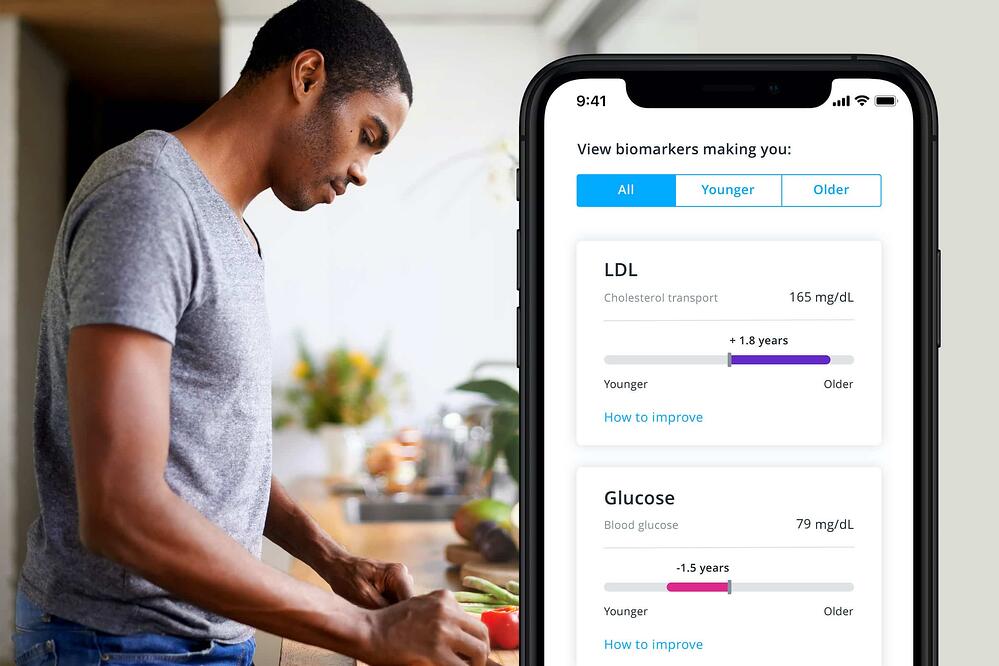Every human should have access to the latest scientific information in the field of longevity. So in 2021, InsideTracker launched the podcast Longevity by Design, serving as a platform for leading longevity scientists to unpack the complexities of cutting-edge research while answering the key question, How can we live a healthier, longer life?
In each episode, Dr. Gil Blander — the founder and chief scientific officer of InsideTracker — and Ashley Reaver, MS, RD, CSSD — the lead nutrition scientist at InsideTracker — join a longevity expert to explore the latest research in the field of healthy aging. And while each of season one’s eight guests has their own niche within the longevity space, there were many topics these experts agreed on.
Here are the top six ways to live a healthier, longer life — according to top longevity scientists.
1. Eat until you’re 80% full
One pillar of the Blue Zones, regions in the world with the highest concentrations of centenarians, is to eat until you’re 80% full. Generally, this is when you feel satisfied but not full quite yet.
Dr. David Katz — the founding director of Yale University’s Yale-Griffin prevention research center — agrees that there’s much to be learned from the Blue Zones. “Let’s acknowledge the fact that that’s where people eat well at scale. It’s not because their doctors or dietitians are doing such a swell job counseling them. It’s because it’s culturally normal to eat well. So ultimately, if our lifestyle is the best medicine, culture is the big spoon that delivers that medicine.”
Eating until you’re only 80% full is a cultural practice as well as one that promotes calorie restriction, or reducing total energy intake while maintaining adequate nutrient intake. Through her research and her own upbringing, Dr. Danica Chen — a professor of Metabolic Biology, Nutritional Sciences & Toxicology at the University of California at Berkeley — confirms this practice to benefit longevity: “There’s a Chinese saying, ‘Eat until you’re 80% full.’ There’s so much wisdom in this simple phrase. Calorie restriction has been studied in the aging field for nearly a century. So much has been learned about aging through a simple diet.”
“When you fast, you turn on these defenses… you really are turning on every cell’s defenses against DNA damage, toxins, everything that causes diseases. It seems that these defenses have a way to slow down negative health effects.” — Dr. David Sinclair
2. Practice intermittent fasting
Intermittent fasting is the focal subject of many discussions regarding longevity, disease prevention, and health. And the topic was certainly top-of-mind for experts interviewed on Longevity by Design.
Dr. David Sinclair — geneticist at Harvard Medical School and a co-founder and co-chief editor of the journal Aging — explains how fasting slows aging: “When you fast, you turn on these defenses…you really are turning on every cell’s defenses against DNA damage, toxins, everything that causes diseases. It seems that these defenses have a way to slow down negative health effects.”
Professor of Biochemistry and Physiology at the National University of Singapore Dr. Brian Kennedy agrees. He even thinks that fasting has greater health benefits than caloric restriction. The key to fasting’s superiority? Its sustainability. Dr. Brian Kennedy explains: “I think fasting is easier to do than caloric restriction. It’s more sustainable for people. A fasting approach is pretty sustainable, and it likely gives people a beneficial effect on age.” Check out these science-backed tips if you’re considering practicing intermittent fasting.
*Please note, food restriction is not for everyone — individuals who are underweight, under 18 years old, pregnant or breastfeeding, have a history or currently struggle with eating disorders, and those with diabetes or on certain medications should refrain from intermittent fasting. Before beginning intermittent fasting, we recommend consulting with a doctor or dietitian to see if it’s appropriate for you.
AGEIST readers get 27% off all InsideTracker products here.
3. Eat nutrient-dense foods
In addition to when and how much food you eat, what you eat also contributes to healthy aging. The good news is that the shopping list of longevity foods is quite simple — and these items are likely stocked at your local grocery store.
Here are a few of the highlights:
Fermented foods: Tenured professor of neurobiology and ophthalmology at the Stanford University School of Medicine Dr. Andrew Huberman discusses the benefits of eating low-sugar, probiotic-rich foods like kimchi, sauerkraut, natto (fermented soybeans), and kombucha. These fermented foods contribute to gut microbiota diversity and can modulate the brain. He also discusses the importance of essential fatty acid intake, commonly found in fatty fish and fish oil supplements.
Fruits and marine plants: Dr. Vera Gorbunova — Professor of Biology at the University of Rochester — emphasizes the importance of eating fruits like wild berries. Interestingly, she also points out that seaweed has many health benefits through activating sirtuin-6, characteristic of long-lived animals and humans.
Whole foods (not processed): Dr. Katz recommends people eat “Food directly from nature. Mostly plants, vegetables, fruits, whole grains, beans, lentils, nuts, and seeds.
4. Engage in strength-based exercises
As you age, hormone levels shift, bones lose density, and muscle mass tends to decrease. So the body’s ability to perform intense physical activity may decline as the decades add up. That being said, strength-based exercises are well studied for their impact on increasing muscle mass, which is crucial in your later years. Developing strong muscles, ligaments, and joints allows you to do the activities you love for longer.
Adjunct Professor of Human Nutrition at the University of California, Berkeley Dr. William Evans and his research team showed that strength and muscle mass are related to factors associated with aging (like walking speed, grip strength, and fracture risk) in older adults. Most notably, muscle mass is modifiable through exercise. He found that, for the first time, very elderly adults who received a weightlifting high intensity interval training (HIIT) protocol had a reduction in the age-related loss of strength and muscle, proving that “the process we all thought was inevitable and unchangeable, is, in fact, treatable.”
And recently, a meta-analysis of over 370,000 participants found that resistance training was associated with a 21% lower risk of all-cause mortality and a 40% lower risk when combined with aerobic exercise. [1] In addition, performing resistance-based exercises even once a week was associated with a reduced risk of cardiovascular disease and all-cause mortality. [2]
AGEIST readers get 27% off all InsideTracker products here.
5. Prioritize sleep
Getting quality sleep is often referenced as the best way to improve health, and for a good reason. The body’s repair processes take place while you’re sleeping. For example, muscle and organ repair, and even the rewiring of connections in the brain occur during sleep. [3] It’s no surprise that quality sleep is predictive of longevity.
A meta-regression of 40 prospective cohort studies found that sleeping less than seven hours per night was associated with an increased risk of all-cause death. [4] A prospective cohort study of 283,443 participants found that a higher sleep score was associated with a reduced risk of all-cause death. [5] Numerous other longitudinal cohort studies report similar findings. [3,6,7]
As a guest on Longevity by Design, Dr. Huberman discusses the importance of quality sleep: “I think it’s safe to say that everything gets better when you’re getting ample quality sleep, and everything gets worse when you’re not. For example, emotional reactivity, wound healing, cancer outcomes, bad decisions, and more.” And, according to Dr. Huberman, the first step to getting a good night’s sleep starts in the morning.
And before you go to bed, make sure to set a consistent bedtime routine that may include reducing or eliminating screen time, taking a warm shower, dehumidifying your bedroom, and closing all blinds.
“Wear a smile and reduce stress in your life because it can affect lifespan.” — Dr. Haim Cohen
6. Improve stress management
Emotional stress is unavoidable. Therefore, the ability to manage and mitigate that stress as it arises is essential for just about every aspect of health. Studies show that a greater positive effect, such as feeling emotions like joy and optimism, is associated with longevity and lower mortality risk. [8] Studies also show that stress management tools like meditation and mindfulness are associated with improved cognitive and physical performance as well as immune health and muscle recovery. A study found that dispositional mindfulness is associated with improvements in cardiovascular health, a key predictor of longevity. [9]
And when it comes to the health benefits of stress management, many Longevity by Design guests weighed in:
- According to Dr. Sinclair, managing stress is a lifestyle habit that can help people live to be 100 years old.
- When asked about the top ways to achieve a healthier, longer life, Dr. Kennedy included stress management as a habit to embrace.
- Dr. Haim Cohen advises, “Wear a smile and reduce stress in your life because it can affect lifespan.”
- On stress management, Dr. Gorbunova finds, “A common trait of centenarians is that they’re very optimistic and have a positive attitude; there’s something to be said!”
Get the most out of life by quantifying how well you’re aging with InnerAge 2.0
So, what next? You’re now equipped with science-backed advice for expanding your lifespan, but it can be challenging to determine how changing your daily habits affect aging in the long-run. That’s where InsideTracker’s InnerAge 2.0 comes in. InnerAge 2.0 calculates your biological age — how efficiently your body is aging internally — by analyzing your blood data for specific markers that are correlated with aging. Depending on your age, sex, and unique biochemistry, the InnerAge 2.0 algorithm either adds or subtracts years from your chronological age, creating your InnerAge. From there, the system provides food, supplement, and lifestyle recommendations from improving biomarkers that indicate you may be aging faster than you should. InnerAge 2.0 is available as either a standalone plan or added to InsideTracker’s most popular and comprehensive option, the Ultimate plan.
AGEIST readers get 27% off all InsideTracker products here.
Living a long, healthy life
The field of longevity research is rapidly evolving, and the experts on the Longevity by Design podcast break down what that research means to live a healthier, longer life. The experts interviewed in season one agreed on several lifestyle habits you can practice to promote living long lives that include what you eat, how much you eat, the type of exercise you participate in, how you cope with stress, and how you sleep.
The InsideTracker team extends a warm thank you to the eight incredible guests that made season one of Longevity by Design a success.
AGEIST readers get 27% off all InsideTracker products here.



